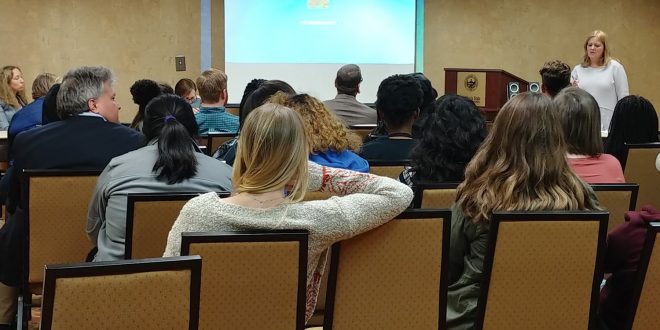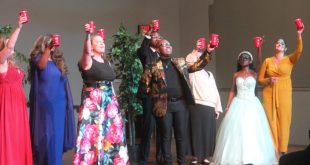On Nov. 15, the Philosophy and Religious Club hosted a panel on the mental health crisis in America. They want to try and find ways to combat the problem. The panelists consisted of Lesley Plugge, the Mental Health Unit manager at Valdosta’s prison. Patty Cosey, licensed private counselor at the Therapy Center here in Valdosta. And Becca Smith, the associate director of VSU’s Counseling Center.
The panelist mostly focused on providing the statistics to prove that there really is a mental health crisis in America. Lesley Plugge started out the panel by giving the experiences she had while working in a prison.
“Close to all inmates at a female correctional facility I use to work at had some sort trauma in their past,” Plugge said.
In the slides, she showed statistics from prisons on mental health. In 2005, half of all inmates had mental illness with 15-20 percent of them having serious mental illnesses like schizophrenia. From 2004 to 2005, more than three times the amount of people with serious mental illnesses were in prisons than in hospitals. Eighty-two percent of females in jail have experienced sexual or physical abuse. 75 percent of females in prison experienced domestic violence. And 57.2 percent of female inmates and 16.1 percent of male inmates have been a victim of sexual assault.
Plugge stated that in the state of Georgia, there are 33 state prisons. Approximately 52,000 offenders and only 16 of those prisons provide mental health services.
“The treatment in prisons for mental health is almost, if not better, than outside of prison,” Plugge said.
She explained that because of the free, accessible treatment in prisons, it is almost, if not better, than the treatments inmates would receive if they were not incarcerated.
Plugge answered the panel’s question on what can improve the crisis. She explained that more accessible mental health first aid programs should be made, and there should be more Treatment Courts. She also stated that the Re-entry Services Division is a step in the right direction to help prevent repeat offenders. It consists of multiple programs that the inmate would go through when being released from jail. It was to better help them stay on their medication and properly re-socialize them back into society.
The next panelist, Becca Smith, stressed that college students are often provided the opportunity to have free counseling.
At VSU, free counseling and consultation is provided at the Counseling Center. Students can also report disturbing or threatening behavior involving any VSU community member that does not meet the level of our Campus Police Department.
Her solution to the crisis is to have more affordable counselors available to the public. This would be achieved by the state giving more funding to that area. She also pointed out a new way for rural areas to receive counseling. For example, Telemental Health is a way to talk to a therapist through technology. This allows for a wider spread area that counselors can reach people in need.
The last panelist, Patty Cosey, explained that because of low funding for mental health by the state, far more people are not getting the help they need.
Suicide rates in the U.S. are up, and 12.3 people commit suicide every minute. Forty-three thousand people in the U.S. die by suicide each year.
Cosey blames this on the accessibility to mental health assistance that many counties do not have. She explained that in order to help the crisis, more funding for mental health services needs to happen. More providers can spread throughout the areas. She also proposed a system that would allow counseling licenses from one state to practice in another.
“If more people were made aware of the crisis, it would incentivize more doctors and nurses to go into the mental health field,” Patty Cosey said.
Questions at the end of the panel were mostly about how to get more funding and where the funding should go. They were answered by explaining that the state is where someone would go to try to get more funding and that funding should go to community mental health programs. This would increase accessibility and overall help people get.
Another question asked was what someone should do if their friend, or anyone, came to them for help. All of the panelists agreed that the person should listen to them and support them. They should also refer them to professional help or report them to a professional if that person begins to worry them.
“The reason we wanted to host this panel is to see what could be done to help the crisis and to overall spread the word about the crisis,” Brody Lathem, vice president of the Philosophy and Religious Club, said. “In the club, we talk about world problems a lot, and we wanted to see how this one might be solved. We also thought it would be important for more people to see the mental health problem and crisis that’s going on in the U.S. right now.”
Story and photo by Andrew Farace, Staff Writer.
For more Campus Life stories, click here.
 The Spectator The independent student newspaper of Valdosta State University
The Spectator The independent student newspaper of Valdosta State University







